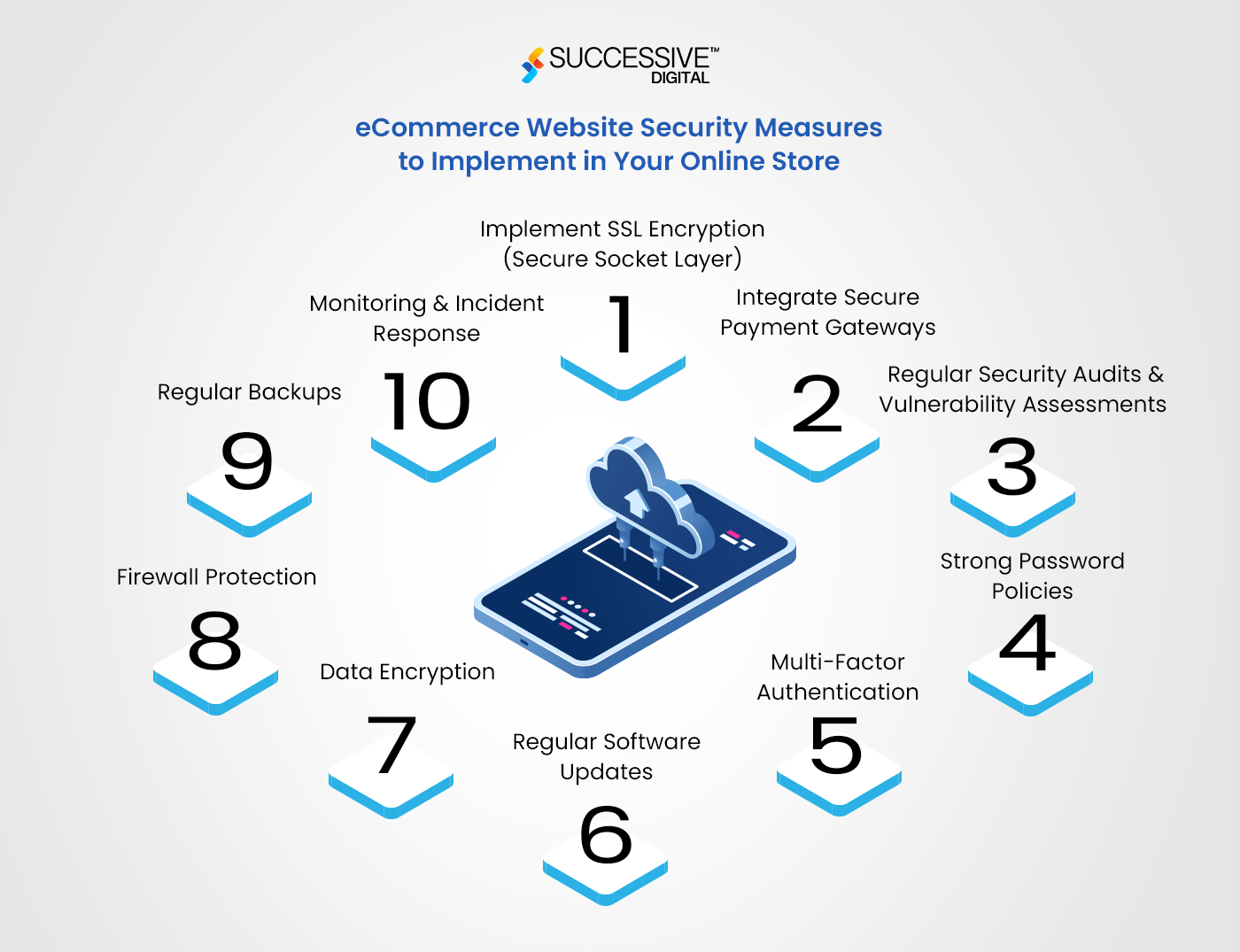We are living in the digital era where customers demand convenience but not at the cost of their critical data getting mishandled. Studies show that the retail industry is one of the most vulnerable industries when it comes to cyber-attacks experiencing up to 32.4% attacks in various forms. This means businesses must implement key strategies to ensure security at every step while streamlining the customer journey. This will also future-proof your business and safeguard it from any potential threats that arise within the evolving landscape of eCommerce.
But first, let us understand what eCommerce security is and what measures you can take to avoid arsing threats in the industry.
eCommerce Security: An Overview
eCommerce security is a critical aspect of online business operations, ensuring the sensitive information of your customers is and fostering trust between businesses and their customers. It is basically an ethical practice that safeguards your online store from unauthorized access while protecting online transactions. To implement security mechanisms into your online store, you can get assistance from a professional eCommerce development company. Moreover, there are four major components of ensuring cyber security for your eCommerce store.
-
Privacy
Privacy includes preventing any activity that will lead to the sharing of customers’ data with unauthorized third parties. Apart from the online seller that a customer has chosen, no one else should access their personal information and account details. A breach of confidentiality occurs when sellers let others have access to such information. An online business should put in place at least a necessary minimum of anti-virus, firewall, encryption, and other data protection. It will go a long way in protecting the Credit/Debit card and bank details of clients.
-
Integrity
Integrity is another crucial component in eCommerce website security. It means ensuring that any information that customers have shared online remains unaltered. The principle states that the online business is stating and utilizing the customers’ information as given, without changing anything. Altering any part of the data causes the buyer to lose confidence in the security and integrity of the online enterprise.
-
Authentication
The principle of authentication in eCommerce security requires that both the seller and the buyer should be real. They should be who they say they are. The business should prove that it is real, deals with genuine items or services, and delivers what it promises. The clients should also give their proof of identity to make the seller feel secure about the online transactions. It is possible to ensure authentication and identification. If you are unable to do so, hiring an expert will help a lot. Among the standard solutions include client login information and credit card PINs.
-
Non-repudiation
Repudiation means denial. Therefore, non-repudiation is a legal principle that instructs players not to deny their actions in a transaction. The business and the buyer should follow through on the transaction part that they initiated. eCommerce can feel less safe since it occurs in cyberspace with no live video. Non-repudiation gives eCommerce security another layer. It confirms that the communication that occurred between the two players indeed reached the recipients. Therefore, a party in that particular transaction cannot deny a signature, email, or purchase.
Common eCommerce Security Issues
Before we jump into the strategies for securing your online store, it is important to understand why cyber threats occur and what are the usual eCommerce security issues that disrupt the safety of customer’s confidential information. The issue includes:
-
Weak Authentication
Weak or easily guessable passwords can make it easier for attackers to gain unauthorized access to user accounts. Hence, it is important to implement strong authentication methods, such as two-factor authentication (2FA), and encourage users to create strong passwords which can be a positive step towards improving eCommerce security.
-
Insecure Data Transmission
Transmitting sensitive data over unsecured connections leaves the user data vulnerable to interception by attackers. This imposes one of the major security challenges in eCommerce.
-
Malicious SQL Injection
SQL injection occurs when attackers input malicious SQL code into input fields, exploiting vulnerabilities in the database layer. This can lead to unauthorized access to or manipulation of the database.
-
Outdated Software and Security Patches
Failure to regularly update and patch the e-commerce platform, server software, and third-party plugins can expose vulnerabilities that attackers can exploit. Irregular security audits and updates cause software vulnerabilities.
-
Phishing Attacks
Phishing involves tricking users into revealing sensitive information by posing as a trustworthy entity. This can be done through fake emails, websites, or messages, and it often targets login credentials or payment information.
-
Inadequate Access Controls
Improper access controls may allow unauthorized users to gain access to sensitive parts of the e-commerce system. Implementing robust access controls and limiting privileges helps minimize this risk.
-
Insufficient Logging and Monitoring
Inadequate monitoring of system logs and user activities can make it difficult to detect and respond to security incidents promptly. This results in cyber attacks and an increase in eCommerce security issues.
eCommerce Website Security Measures to Implement in Your Online Store

Securing your eCommerce website is crucial to protect sensitive customer information, build trust, and maintain the integrity of your online store. Here are key strategies and eCommerce website security measures you should consider.
-
Implementing SSL Encryption
Secure Socket Layer (SSL) encrypts the communication between the user’s browser and the server, ensuring that data transmitted, such as login credentials and payment information, remains confidential. Obtain an SSL certificate from a trusted Certificate Authority (CA) and install it on your web server. Ensure that all pages, not just the checkout page, use HTTPS.
-
Integrate Secure Payment Gateways
Use reputable and PCI DSS-compliant payment gateways to process transactions securely. This ensures that payment information is encrypted and handled according to industry standards. Integrate payment gateways like PayPal, Stripe, or others that comply with the Payment Card Industry Data Security Standard (PCI DSS).
-
Regular Security Audits and Vulnerability Assessments
Regularly assess your website for vulnerabilities by conducting security audits. This helps identify potential weaknesses that could be exploited by malicious actors.
Employ security experts or reliable eCommerce web development experts who will utilize automated tools to conduct periodic security audits and vulnerability assessments.
-
Strong Password Policies
Enforce strong password policies for both customers and admin users to prevent unauthorized access to accounts. Set minimum password length, require a combination of uppercase and lowercase letters, numbers, and special characters. Encourage users to update passwords regularly.
-
Multi-Factor Authentication
Add an extra layer of security by implementing multi-factor authentication (MFA). This requires users to provide additional verification beyond just a password. You can use MFA solutions such as one-time codes sent via SMS, email, or authentication apps like Google Authenticator.
-
Regular Software Updates
Keep all software components, including the eCommerce platform, plugins, and server software, up-to-date to patch security vulnerabilities. Set up automatic updates for your eCommerce platform and regularly check for updates to third-party plugins. You can also read our blog eCommerce web development guide to understand the ins and outs of a fully customized eCommerce website development.
-
Data Encryption
Data encryption is an important element for securing the data from unauthorized access. Encrypt sensitive data at rest (stored on servers) and in transit (being transmitted between the user’s browser and your server). To implement data encryption use technologies like TLS for data in transit and encrypt databases and stored files on the server.
-
Firewall Protection
Implement a web application firewall (WAF) to filter and monitor HTTP traffic between a web application and the Internet. Set up a WAF to block malicious traffic, SQL injection, cross-site scripting (XSS), and other common web application attacks.
-
Regular Backups
Regularly backing up your website data is crucial to prevent data loss due to cyber-attacks or technical failures. Set up automated backup systems and store backups securely, ensuring quick restoration in case of a security incident.
-
Monitoring and Incident Response
Lastly, set up a continuous monitoring process of your website’s traffic and behavior to detect anomalies and potential security incidents while improving eCommerce website security. Also, have an incident response plan in place. Use security information and event management (SIEM) systems, and intrusion detection systems (IDS), to regularly test your incident response plan.
Conclusion
Digital commerce is continuously evolving but with that security becomes a major concern. Securing every user’s credentials who sign up for your online store is essential to building long-term customer relationships. In order to build a secure eCommerce store, you must implement the strategies discussed in this blog and most importantly, partner with a professional eCommerce web development company like Successive Digital. Our eCommerce experts can help in integrating security mechanisms into your online store, to secure online transactions and provide a seamless customer experience.
Frequently Asked Questions
To check the security one of the effective methods is to start by examining the SSL certificate and then proceed to implement other recommended security measures. This will ensure the website is secure and provide your users with a safe shopping environment.
The eCommerce website security includes: implementing SSL certificates, using stronger passwords, using a strong firewall, and backing up data to ensure your website data is secured.
Compliance involves applying regulatory standards to meet contractual or third-party regulatory requirements. In contrast, security constitutes the implementation of adequate technical controls to protect digital assets from cyber threats.












